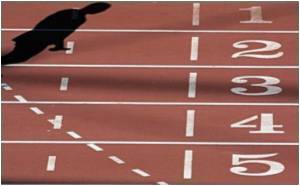Though warming up before athletic competition increases muscle temperature, accelerates oxygen uptake kinetics and increases anaerobic metabolism, all of which enhances performance,

They found that although muscle contractile response decreased more after the traditional warm-up, indicating greater fatigue, there was a decrease in contractile response after both warm-ups. This, according to Elias K. Tomaras, a co-author, "indicates that an even shorter warm-up might be better for athletes who want to tap into PAP (post-activation potentiation)."
The shorter warm-up permitted better performance, as well. Peak power output was 6.2 percent higher and total work was 5 percent higher after the experimental warm-up than after the traditional warm-up, results the researchers said were significant, and could make a substantial difference in competitive events.
According to co-researcher Brian R. MacIntosh, "the findings suggest that competitive athletes may reap greater rewards from PAP by engaging in less strenuous warm-up than conventional wisdom dictates. A better approach would be to aim for just enough activity to promote PAP without creating fatigue".
The findings are published in the Journal of Applied Physiology.
Source-ANI









